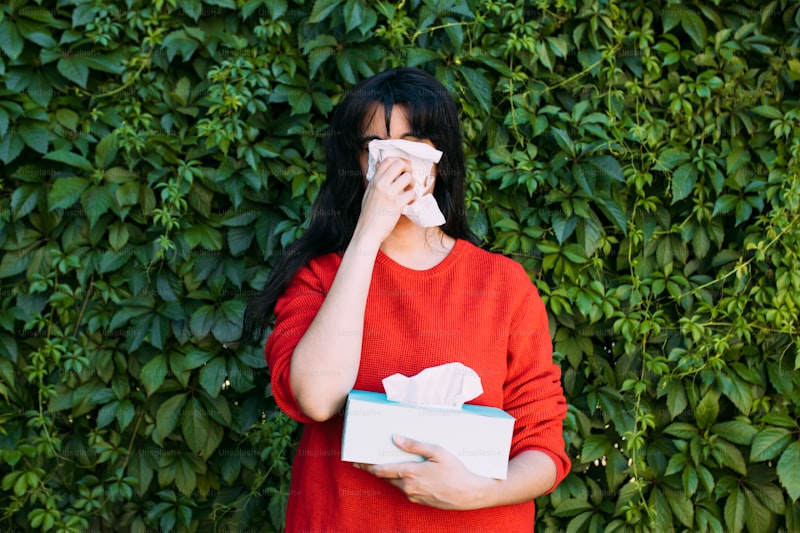
One of the most effective lifestyle changes is maintaining a clean living space. Regularly dusting surfaces, vacuuming carpets, and washing bedding can help minimize exposure to allergens like dust mites and pet dander. Using hypoallergenic pillowcases and mattress covers can also provide relief during sleep.
Another crucial aspect is managing outdoor activities. Checking pollen forecasts and planning outdoor activities accordingly can reduce exposure to allergens. Wearing sunglasses and hats can prevent pollen from entering the eyes and hair, respectively, while showering and changing clothes immediately after outdoor activities can remove allergens from the skin and clothing.
Dietary adjustments can also play a significant role. Avoiding trigger foods and focusing on a balanced diet rich in fruits, vegetables, and omega-3 fatty acids can support overall immune health. Drinking plenty of water helps thin mucus secretions and keeps nasal passages hydrated, easing congestion.
Engaging in regular physical activity strengthens the immune system and reduces the severity of allergic reactions. Exercise also promotes better sleep, which is crucial for managing allergy symptoms effectively.
Lastly, incorporating stress-reducing techniques such as yoga, meditation, or deep breathing exercises can help manage allergies. Stress can exacerbate allergic reactions, so finding ways to relax and unwind is essential.

By integrating these lifestyle changes, individuals can proactively manage their allergies and improve their overall well-being without relying solely on medication. Taking small steps towards a healthier lifestyle can lead to significant improvements in allergy management over time.
Transforming Your Diet: Key Changes to Combat Allergies
Are you tired of dealing with allergies that just won’t quit? Transforming your diet might be the game-changer you’ve been searching for. Allergies can be relentless, but with a few strategic adjustments to what you eat, you could find significant relief.
Imagine your body as a fortress, with certain foods acting like gatekeepers. Some foods can fortify your defenses against allergies, while others might unwittingly invite them in. It’s all about choosing wisely. Incorporating more anti-inflammatory foods, like leafy greens, berries, and fatty fish rich in omega-3s, can help calm the storm within your immune system.
Think of inflammation as a fire raging in your body. By fueling it with processed foods high in sugars and unhealthy fats, you’re essentially pouring gasoline on the flames. Swap these out for whole foods that are nutrient-dense and packed with antioxidants. These act like firefighters, dampening inflammation and reducing allergic reactions.
But don’t just focus on what to add—consider what to avoid as well. Dairy, gluten, and nuts are common culprits that trigger allergies in many people. While they may be tasty, they can also wreak havoc on your immune system. Experimenting with an elimination diet can help pinpoint which foods might be causing you trouble.

Picture your body as a finely tuned machine. Just like a car needs the right fuel to run smoothly, your body operates best when fed with foods that support its natural balance. Cut through the confusion of modern diets by returning to basics: fresh fruits, vegetables, lean proteins, and whole grains. These foundational foods provide the building blocks for a healthier you, less prone to allergic flare-ups.
So, are you ready to take charge of your diet and conquer your allergies? With a few simple changes, you can transform your health from the inside out. Start today by making mindful choices that nourish your body and empower you to live allergy-free. Your journey to a happier, healthier you begins with what’s on your plate.
Holistic Approaches: Lifestyle Tweaks for Allergy Relief
Living with allergies can be challenging, but adopting holistic approaches can significantly alleviate symptoms and improve overall well-being. Instead of relying solely on medications, lifestyle tweaks offer a natural and sustainable way to manage allergies.
One of the key lifestyle changes for allergy relief is adjusting your diet. Incorporating anti-inflammatory foods such as turmeric, ginger, and omega-3 rich fish can help reduce allergic reactions. These foods have properties that can calm inflammation in the body, which is often heightened during allergy seasons.
Moreover, maintaining a clean environment is crucial. Regularly cleaning your home to remove dust, mold, and pet dander can greatly reduce allergens indoors. Using a HEPA filter in your vacuum cleaner and air purifier can further trap allergens, improving air quality and reducing allergy symptoms.

Engaging in regular exercise also plays a vital role in managing allergies holistically. Exercise helps boost the immune system and reduces inflammation, making it easier for your body to fight off allergens naturally. However, it’s important to choose indoor activities during high pollen days to avoid exacerbating symptoms.
Furthermore, managing stress levels is essential for allergy sufferers. Stress can weaken the immune system and increase inflammation, making allergies worse. Practicing relaxation techniques such as deep breathing, meditation, or yoga can help reduce stress and improve overall resilience against allergens.
Lastly, incorporating herbal supplements like butterbur or quercetin can provide additional relief from allergy symptoms. These natural remedies have anti-inflammatory and antihistamine properties that can complement other holistic approaches.
By integrating these lifestyle tweaks into your daily routine, you can effectively manage allergies in a natural and sustainable way, promoting better health and well-being overall.
Beyond Medication: Lifestyle Strategies for Allergy Management
Ever thought about the air you breathe? Yeah, indoor air quality can make a huge difference when it comes to allergies. Investing in a good air purifier can be a game-changer. These gadgets work like superheroes, filtering out those pesky allergens that float around your home, giving you cleaner air to breathe in.
Oh, and speaking of home, let’s talk about cleaning. No, not just your regular once-over with a duster. We’re talking deep cleaning – getting into those nooks and crannies where dust mites love to hide. Vacuuming regularly with a HEPA filter can suck up allergens like nobody’s business. It’s like waving a magic wand and saying, “Poof! Allergies, be gone!”
Now, onto everyone’s favorite topic – diet. Did you know that what you eat can impact your allergies? Yup, it’s true. Incorporating more anti-inflammatory foods like fruits, veggies, and omega-3-rich fish can help calm those immune system jitters. It’s like giving your body a shield against allergens, keeping them at bay.
And hey, here’s a fun fact – stress can actually make allergies worse. Crazy, right? So, finding ways to chill out can be surprisingly effective. Whether it’s yoga, meditation, or just taking a walk in nature, giving your mind a break might just give your allergies a break too.
Lastly, let’s not forget the great outdoors. Pollen might be the bane of your existence during allergy season, but you don’t have to barricade yourself indoors. Checking pollen counts and planning your outdoor activities accordingly can make a world of difference. And hey, rocking those cool shades can also protect your eyes from allergens – talk about a win-win!
So, there you have it – a few lifestyle strategies that go beyond the usual meds. From purifying your air to calming your mind, these tips are all about taking charge and living allergy-free. Because hey, why let sneezing spoil your day when you can take a few simple steps to keep those allergies in check?
From Stress to Serenity: How Relaxation Techniques Can Ease Allergies
Imagine your body as a fortress, with stress acting like breaches in the walls, allowing allergens to infiltrate more easily. Techniques like deep breathing, meditation, and progressive muscle relaxation serve as reinforcements, fortifying your defenses against allergens. These practices not only calm the mind but also signal the immune system to stand down from its heightened state of alert, reducing the body’s reactivity to allergens.
Deep breathing exercises, for instance, flood your system with oxygen, promoting a state of calm that counteracts the physiological stress response. This, in turn, helps regulate inflammatory responses that can exacerbate allergy symptoms. Meditation, on the other hand, trains the mind to focus and relax, alleviating the mental toll that stress places on the body.
Progressive muscle relaxation works by systematically tensing and releasing muscles, teaching your body to recognize and release physical tension. This process not only promotes relaxation but also enhances overall well-being, which can contribute to a more balanced immune response.
Incorporating these techniques into your daily routine can make a significant difference in managing allergies. Picture them as tools in your wellness arsenal, each one capable of restoring a sense of equilibrium between your body and its environment. By reducing stress levels, you’re not just easing your mind—you’re creating a harmonious environment where allergies are less likely to flare up.
Next time you feel the weight of stress bearing down, consider the impact it might have on your allergies. Embracing relaxation techniques isn’t just about finding calm; it’s about empowering your body to resist the triggers that can disrupt your well-being. So, take a deep breath, find your center, and discover how the path to serenity can lead to relief from allergies.
Sleeping Soundly: How Better Sleep Habits Can Reduce Allergy Symptoms
When we talk about allergies, most of us think about the typical symptoms like sneezing, itchy eyes, and congestion. But did you know that poor sleep can actually make these symptoms worse? It’s true! When your body doesn’t get enough rest, it can weaken your immune system, making you more susceptible to allergens like pollen, dust mites, and pet dander.
So, how exactly does better sleep help? Think of it this way: sleep is like hitting the reset button for your body. It’s during sleep that your immune system gets a chance to recharge and your body repairs itself. When you get enough high-quality sleep, your immune system functions better, which means it can fight off allergens more effectively.
But it’s not just about the quantity of sleep; quality matters too. You might spend eight hours in bed, but if you’re tossing and turning or waking up frequently, you’re not getting the full benefits of sleep. Creating a sleep-friendly environment can make a world of difference. Keep your bedroom cool, dark, and quiet. Invest in a comfortable mattress and pillows that support your body. And try to establish a relaxing bedtime routine to signal to your body that it’s time to wind down.

Now, here’s the sciencey bit: when you sleep, your body produces less histamine, a chemical that plays a key role in allergic reactions. So, by improving your sleep habits, you’re not only giving your immune system a boost but also helping to reduce the release of histamine in your body. It’s like giving allergies a one-two punch!
Frequently Asked Questions
How does indoor environment affect allergies, and what changes can I make?
Learn how indoor environments impact allergies and discover effective changes you can implement to reduce allergens.
Are there natural remedies and practices that help alleviate allergy symptoms?
Discover effective natural remedies and practices to alleviate allergy symptoms with our concise FAQ guide. Learn how simple lifestyle changes and natural supplements can provide relief from allergies, promoting better well-being without harsh medications.
How can diet impact allergies, and what should I avoid or include?
Understand how your diet can affect allergies. Learn what foods to avoid and include to manage allergies effectively.
What are the most effective lifestyle changes to manage allergies?
Discover effective lifestyle changes to manage allergies with our concise FAQ guide. Learn practical strategies like identifying triggers, implementing dietary modifications, optimizing indoor air quality, and incorporating stress management techniques. Start taking control of your allergies today!
What lifestyle habits should I adopt to minimize seasonal allergy flare-ups?
Learn how to minimize seasonal allergy flare-ups by adopting healthy lifestyle habits. Discover effective strategies such as monitoring pollen counts, keeping windows closed during peak seasons, using air purifiers, practicing good hygiene, and wearing appropriate clothing outdoors.



